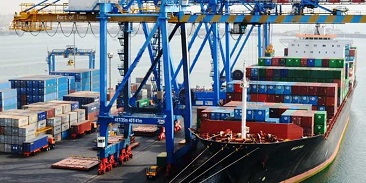The Acting Head of the Ghana Customs Laboratory, Samuel Akrofi, has said the Customs Division of Ghana Revenue Authority (GRA) has successfully reduced the number of uncleared containers at the Tema Port from 4,600 to 3,600, marking a 21.7 percent drop within ten days.
According to him, the pile-up, which started in July 2024 due to scanner breakdowns, had been slowing down trade and increasing congestion at the port.
“The breakdown of scanning equipment led to delays in processing cargo. By December, the number of containers at the Meridian Port Services (MPS) had risen to 4,600. The situation was getting out of hand,” he said.
“The companies responsible for the scanners made efforts to resolve the breakdowns by flying in experts, but the issues persisted, causing significant delays,” Mr Akrofi said on Eye on Port, a programme by the Ghana Ports and Harbours Authority (GPHA).
To address the issue, he said Customs introduced new measures in January 2025. One key action was to move uncleared containers to internal container depots (ICDs), where they would undergo physical inspection instead of being scanned.
“We needed to clear the backlog without compromising security, so we transferred the containers to depots like the Golden Jubilee Terminal for further checks,” Akrofi noted.
He emphasised that although the containers were not scanned, they were strictly inspected manually to ensure that security was maintained.
“The scanners complement our work, but Customs has other technologies and processes to verify shipments. We did not take any risks,” he said.
Also, he said beyond addressing the backlog, Customs is making efforts to improve efficiency in cargo clearance through the Integrated Customs Management System (ICUMS) – a digital platform that streamlines trade processes by reducing paperwork, enhancing risk management and improving collaboration among agencies.
Furthermore, he highlighted that Customs has shifted from a border-focused approach to a supply chain-based system.
“We no longer just check goods at the border. Now, we track shipments throughout the supply chain using technology. The use of risk profiling allows trusted traders to clear goods faster, while high-risk traders face stricter checks,” he elaborated.
Moreover, he noted that Customs is also focused on increasing government revenue. Akrofi said that instead of checking every single shipment, it will use data analytics, artificial intelligence and machine learning to identify non-compliant traders.
“Most shipments are compliant, but a few pose a security threat. Our job is to find and stop those ones without slowing down the entire process,” he explained.
